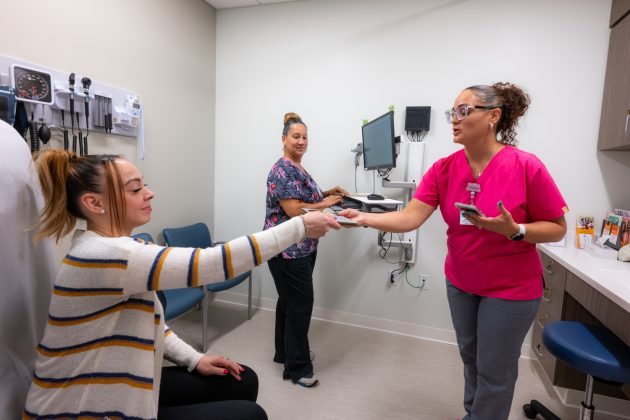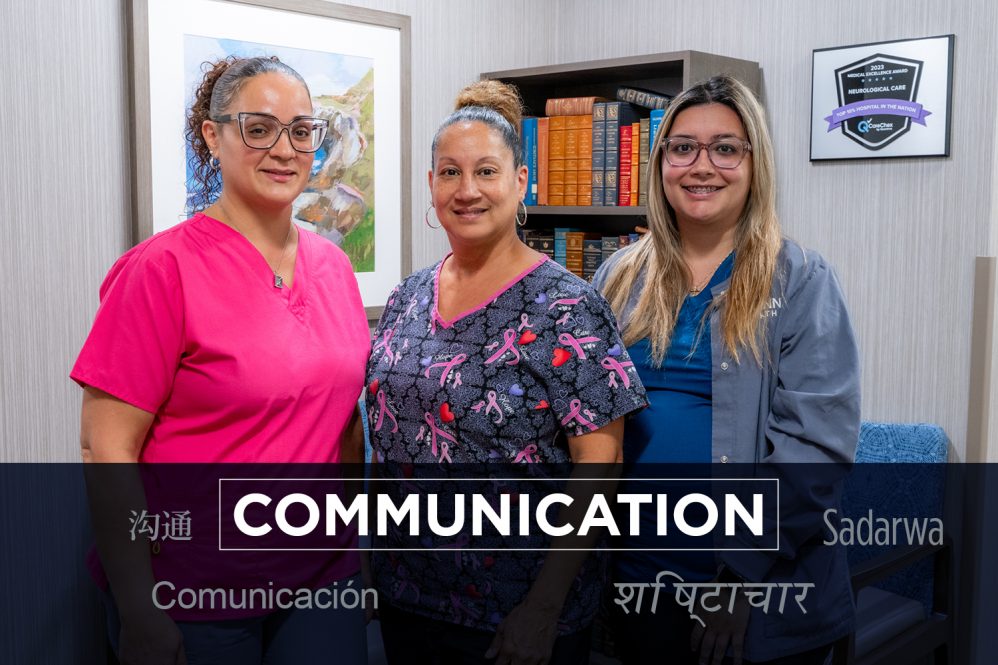Already vital in delivering health care, communication has an added importance when dealing with social determinants of health.
Socioeconomic, employment, and housing status are examples of social determinants of health, a term used to describe factors beyond medical that can affect health and well-being. Cultural and language barriers can exacerbate these factors.
The right people in the right setting can help overcome those barriers by communicating effectively, not only by improving the care experience, but also by having patients leave the encounter with a better understanding of their situation.
Some of them have said to me, ‘I am happy, proud that there is a Spanish-speaking person here that can understand me.’
— Maggie Negron
An example of this is UConn Health’s outpatient neurology practice, where patients can have a harrowing diagnosis that, once learned, sets them on a lifelong path of trying slow progression, arranging supportive care and planning services, and in many cases, seeking resources to help with life’s necessities.
“Addressing social determinants of health is critical because many patients already are dealing with difficult medical conditions, and adding financial or social stress can make their situation even more overwhelming,” says Maggie Negron, one of the medical assistants in neurology. “If a patient reports that they are struggling, we forward the information to the social work team or population health. From there, the patient receives tailored resources. This helps ensure that patients receive not only medical care but also support in navigating challenges that affect their overall well-being.”
Negron and fellow MA Izamarie Colón are among several UConn Health medical assistants who are fluent in both English and Spanish, which goes a long way in making Spanish-speaking patients feel more comfortable and more heard.
“It’s very difficult to translate things, especially for patients,” Colón says. “They might understand a little bit of English, but when it comes to their medical terminology, they don’t know how to translate properly. So having a provider and an MA who do speak Spanish, it makes it easier for them to let us know what’s going on, what do they need help with. And it’s easier for them to understand us as well because neurology is a complicated world, so explaining things to the patient in the language that they understand is very important.”

Colón spends a majority of her time serving patients in UConn Health’s Parkinson’s Disease and Movement Disorders Center, and Negron is primarily in UConn Health’s Multiple Sclerosis Center.
Parkinson’s Disease is a progressive neurodegenerative illness that leads to loss of dopamine cells in the brain, and the main symptoms associated with it are tremors, stiffness, slowed movements and balance changes.
MS is a chronic autoimmune disorder commonly is diagnosed between the ages of 20-45, presenting with different symptoms, the more common signs including optic neuritis, brainstem syndrome, and transverse myelitis.
With both conditions, communication is a crucial aspect of care because the better the patients and their families understand the disease, the better position they are in to manage it.
“Multiple sclerosis requires a long-term relationship between the patient, patient’s family and care team, and it can be a devastating news when we first discuss the diagnosis with our patients and families,” says Dr. Hamza Coban, one of the UConn Health neurologists who specialize in MS. “Sometimes, our patients are not able to express how they feel, what concerns or questions they may have during a clinic visit, or we may not be able to recognize or understand their concerns or needs even with best of efforts due to language barriers and different priorities that might be coming from different cultural sensibilities and priorities. Our medical assistants are an essential part of our team to help our patients.”
MAs usually are the first to interact with patients once they leave the waiting room, and the ones who often follow up with patients after they leave.
“We are kind of setting the pace for how their visit is going to go,” Colón says. “I do have a lot of Spanish-speaking patients in our clinic, and it definitely makes a difference. They know me by name.”
Fitting as UConn Health observes Hispanic Heritage Month, Sept. 15 to Oct. 15, both Colón and Negron are from Puerto Rican families and grew up speaking Spanish as their first language.
“Sometimes the patients need that comfort when they come in, because sometimes they don’t have that at their home and here they feel more comfortable,” Negron says. “Whatever they need to talk about, sometimes it’s just easier for them to release their stress, frustration, due to their diagnosis. Some of them have said to me, ‘I am happy, proud that there is a Spanish-speaking person here that can understand me.’”
Our patients feel more confident in their care team when they see providers who will understand and advocate for them. — Dr. Hamza Coban
That comfort level can open doors to resources patients could use to overcome social determinants of health that otherwise may not have been communicated.
“One story that stands out involved a patient who was struggling with both health issues and financial instability,” Negron says. “After learning about their difficulties with paying bills during a routine checkup, I connected them with our social work team. The social worker helped the patient find community resources, and later the patient shared how much of a difference it made in their life. Being part of that positive change was incredibly rewarding.”
Dr. Jeffrey Hines, UConn Health’s chief diversity officer, says effective communication is the cornerstone of healthy and productive working and patient relationships.
“Language concordance, through bilingual MAs and other members of the health care team, allows for improved assessment of social determinants of health, deploying culturally aligned resources, and the ability to monitor the impact of the resources delivered, and it’s a driver of mitigating health disparities,” Hines says.
MS is among the conditions that can be especially devastating to the Hispanic population.
“Our patients feel more confident in their care team when they see providers who will understand and advocate for them,” Coban says. “Our MAs provide us with further insight and help us understand patient’s specific needs and priorities. They do a lot of education in patients’ primary language. They are also involved in support groups and social events dedicated to our MS patients. I hear a lot of positive feedback from my patients about our MAs and the rest of the team. It’s also evident from our better patient outcomes, adherence to therapy, lower rates of no shows.”
Medical Assistants Recognition Week is Oct. 21-25. UConn Health employs 280 MAs, most of them in outpatient settings, some on hospital floors.
“It’s a very rewarding job when you see a patient, and you help them through something, and you can see the progress in their condition because of the work that you do,” Colón says.



